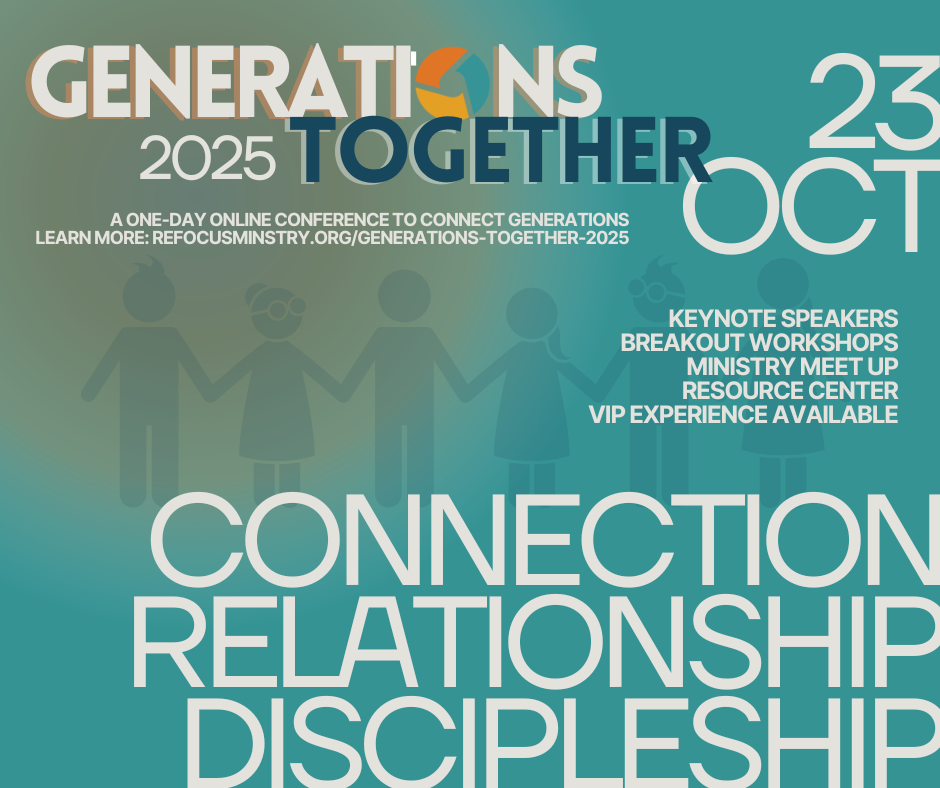It’s no secret. Attendance at church across the board is down.
Numbers fluctuate depending on what metric you use and what statistics you look at, but for the most part, it’s safe to say, that regular weekly attendance in a church building is in a downward spiral. Some studies show that the average “regular attender” at church only comes once or twice per month and obviously, this affects the attendance of children and youth as well.
The latest research shows a new surprising trend: Young women are leaving the church at a greater rate than young men, meaning that for the first time in a long time, there are more Gen Z males than females that have remained affiliated with the church. The research indicates that in this specific instance, young women point to gender inequalities and ongoing revelations of sexual abuse in the church (generally perpetuated on women) as reasons for their disaffiliation.
But what about the larger overall trends? What is to blame for dwindling attendance? ’m always struck by the reasons that are given by those in children, youth and family ministry for why attendance is down.
“Sports are to blame.” And let’s be honest, team sports, especially travel ball, are one reason. Practices and games no longer get put on hold for Sundays and Wednesday nights so if a child joins a team, they will likely be asked to be with the team on those days at some point.
“Parents are to blame.” The common line is that parents no longer value church and therefore church is seen as optional while other things require commitment. In fact, just today I saw a tweet that read, “The most common parenting perspective fail I see played out on a regular basis: church should be convenient but sports require sacrifice” which is a combination of the two observations above.
“Church is optional.” Some have pointed to the fact that church attendance is sometimes used as a disciplinary tool (i.e. Didn’t do your homework? No youth group for you!) while others comment on how school is a priority but church is not.
There’s a lot of blame being doled out for why things are the way they are. But is it possible that the criticism we often shift outward also needs to be directed inward?
Instead of blaming sports and ballet and parents and society and school and (fill in the blank), it seems it would be wise for us, the church, to look inward and ask,
“Why is it so easy to leave? How have we created an environment that implies consistency is not necessary, that commitment is optional, and “church” is a thing of convenience?
I believe if we take the time to honestly critique ourselves, we will find that we must share part of the blame for the shift in church attendance and necessity.
Church as an Event
I’ll never forget hearing the phrase, “Make Sunday morning the best hour of their week!” encouraging ministers to focus all of their attention on making that Sunday morning hour so popping, so exciting, so over-the-top memorable and fun, that kids couldn’t wait to come back.
However, the trade-off for that is that we had to create programs that appealed primarily to the senses and not necessarily to the soul and spirit. That’s why the approach of using church attendance as discipline is an easy “punishment” to dole out.
Church as Competition
A friend was talking to me the other day about church programming and marketing and made the statement, “When will the church realize that we really can’t compete with the world? We have a totally different thing to offer.”

And that’s just it. Our churches, funded nearly entirely by donations, cannot compete with concerts and movies and malls filled with all the things. We can’t compete with Instagram and Snapchat and Twitter feeds. We can’t compete with multi-billion dollar ad campaigns and streamlined marketing plans. And we don’t need to. It’s not a competition. We aren’t going to win people back to church by being the newest, coolest thing on the block. We are not in competition with the world OR with each other. We have Jesus. We have community. We have truth. It’s not a competition.
Church as a Building
My husband has pointed out quite frequently that if you look at the history of the word church, it changes over time. The simplest explanation is that in the New Testament, “church” was “ekklesia” which translates to “a gathering of people called out”. Over time, as buildings were built for those people to meet in, the German word “kirche” took the place for church and it referred to the building. So when we ask, “Did you go to church?” we usually mean, “Did you go to a building?” But the reality is, church isn’t a building.
We all know that in our head, but when we measure things like “church attendance” we are looking specifically to people being in a kirche not people living in ekklesia. And when we invite people to church, we invite them to a place, but, as my husband often points out, we should be inviting them into our lives. If church is a building, it’s easy to miss a week or two. If church is community, it’s much harder to skip out.
Church as Age-segregated Silos
We don’t see each other and so we don’t miss each other. We don’t know one another’s names or what our lives look like outside of Sunday morning, so we can’t check in on one another through the week and ask how things are going. We don’t pray together. We don’t worship together. And we don’t share life together.
And we can give all the reasons in the world why that is okay and best and most convenient for all, but the reality is, the consequence of consistently segregating the generations from one another has led to a breakdown in community and a lack of intergenerational relationships from which discipleship and mentorship flow.
I’m sure there are many more things we could add to this list. I’m sure that some of them are particular to individual faith communities. I’m also sure it is easier to blame sports and school than to look inwardly at ourselves and ask hard questions about how we, the church, have contributed to the lackadaisical attitude towards regular attendance and consistent community. And in regard to the newest data, how the church has been complicit for decades in hiding abusers and creating environments where these things can happen.
But what if we changed? What if instead of focusing the blame elsewhere, we determined to look to ourselves first and to do what we could to create a community, an ekklesia, that was focused not so much on attendance as discipleship, not so much on programming as relationship, not so much on a building and a time as a people and a way of life. A community that is safe for women and men to participate in with a common mission and a clear commitment to loving God and loving others. And even more challenging…
What if we started with our church?
REGISTRATION IS NOW OPEN

Generations Together is a one-day online conference designed to inspire and equip church leaders, volunteers, and ministry teams to build bridges across generations.
Hosted by Dr. Christina Embree of ReFocus Ministry, this interactive experience features:
- Dynamic Keynote Sessions with thought leaders in intergenerational discipleship
- Breakout Workshops led by practitioners who’ve seen transformation in real congregations
- Ministry Meetups where you’ll connect directly with speakers and other attendees in live chat spaces
- VIP Access to all session recordings, exclusive digital resources, and Q&A panel with leading voices
Whether you’re new to intergenerational ministry or looking to deepen what you’re already doing, this conference will give you practical tools, inspiring stories, and meaningful connections to help your whole church grow—together. LEARN MORE
🎟 Early Bird: $15 (8/1/2025)| Regular: $30 (9/1/2025)
🌟 VIP: $50 (includes exclusive panel discussion + digital resource packet + all session recordings)
About the Author

Christina Embree is the founder and director of ReFocus Ministry. She holds a masters in ministry focused on Children, Youth, and Family Ministry and a doctorate in spiritual formation with a focus on age segregation and intergenerational ministry.
In addition to coaching churches of multiple denominations and traditions all around the globe, Christina serves as the Minister of Generational Discipleship for the Great Lakes Conference of the Brethren in Christ and as a pastor at Plowshares Brethren in Christ in Lexington, Kentucky.
She is widely recognized as a speaker and author in the areas of generational discipleship, intergenerational ministry, and family ministry. As the mother of three children, she is familiar with the challenges of faith at home and pastoral ministry. She along with her husband Luke share a love for the church, their community, and the global work of peace and restoration through Jesus.


